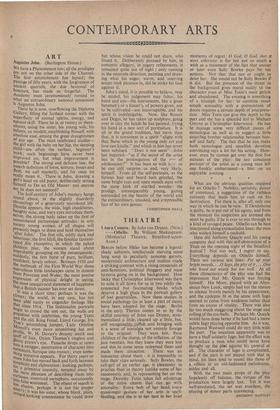THEATRE
I Am a Camera. By John van Druten. (New.) —Othello. By William Shakespeare. (Memorial Theatre, Stratford-upon- Avon.) BERLIN before Hitler has become a legend: shady cabarets, intellectuals starving upon lung soup in peculiarly noisome garrets, modernistic architecture and nudism made a striking contrast with a rising crescendo of anti-Semitism, political thuggery and mass hysteria going on in the background. How lucky that Christopher Isherwood was there to note it all down for us in two oddly dis- connected but fascinating books which deserve a high Rlace in the portrait gallery of lost generations. Now these studies in social pathology (or at least a part of them) have been adapted for the stage. Berlin in the early Thirties comes to us by the skilful courtesy of John van Druten, senti- mentalised a little, cleaned up a little, but, still recognisably raffish and bringing with it a sense of nostalgia not entirely foreign to the original. They were lost, these children of the slump, of the inflation, of the jazz twenties, but they knew they were lost and this in some sense redeemed them and made them attractive. There was an innocence about them : it is impossible to take their vices seriously. Sally Bowles, the call-girl of an earlier age, is pleasanter in practice than in theory (unlike some of her successors), and, in representing her on the stage, Dorothy Tutin takes full advantage of the naïve charm that can go with amorality. Every bob of her head, every quasi-regal gesture of her arm is spell- binding, and she is at her best in her brief
moments of regret: 0 God, 0 God, that it were otherwise is for her not so much a wish as a statement of the fact that sooner or later even Sally Bowles pays for her actions. Not that that can or ought to deter her. She would not be Sally Bowles if it did. But the presence of the threat in the background gives moral reality to the character even at Miss Tutin's most girlish and abandoned. The evening is something of a triumph for her: to combine sweet simple sensuality with a premonition of doom requires a certain depth of interpreta- tion. Miss Tutin can give this depth to the part and she has a splendid foil in Michael Gwynn as Christopher Isherwood. He has to manage some very difficult pieces of monologue as well as to suggest a little sister/big brother relationship between him- self and Sally. The fact that he can make both monologue and unselfish devotion convincing says a lot for his acting. How- ever, even he cannot get over the first five minutes of the play: the too conscious portrait' of the artist as a young man left one frankly embarrassed—a blot on an enjoyable evening.
What are the obvious qualities required for an' Othello ? Nobility, certainly, power of command, a suggestion of the ruthless curiosity that leads him to rush on his destruction. For there is, after all, only one way in which he can be sure. If Desdemona is guilty, he is put out of his agony, and from the moment his suspicions are aroused she must be guilty if he is ever to win through to a kind of ravaged peace. Othello can be best interpreted along existentialist lines: the man who wished himself a cuckold.
How did Anthony Quayle and his young company deal with this self-destruction of a Titan on the opening night of the Stratford festival ? Not too well, I regret to say. Everything depends on Othello himself. There are various test lines: Put up your bright swords, .. .0 logo, the pity of it ..One who loved not wisely but too well. At all these climacterics- of the play one had the impression that Mr. Quayle was forcing himself. His Moor, played with an Abys- sinian New Look, simply had not the stature to silence brawls merely by his appearance, and the epileptic fit in the scene with Iago seemed to come from weakness rather than from an excess of vitality. There 'was also far too much staggering about the stage and rolling of the eye-balls. Perhaps Mr. Quayle would have done better if he had had a more subtle lago playing opposite him. As it was, Raymond Westwell could do very little with the part. The intention apparently was to have a bluff soldierly lam but the effect was to produce a man who could never have thought up the plot against his general at all. The character of lago is complicated, and if the part is not played with that in mind, his lines tend to sound like those of a villain in an old-fashioned melodrama, asides and all.
With the two main props of the play hopelessly off balance, the virtues of the production were largely lost. Yet it was well-produced, the set was excellent, the playing of minor parts convincing.
ANTHONY HARTLEY


































 Previous page
Previous page